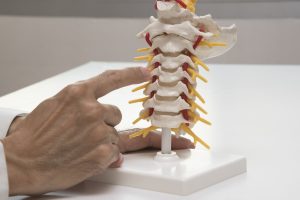Cervical Disc Replacement
Your cervical spine is made up of seven bones, known as cervical vertebrae, stacked on top of each other forming the neck area. The cervical discs are the cushions that lie between the cervical vertebrae and act as shock absorbers to allow your neck to move freely.
Your cervical spine also forms a protective tunnel for the upper part of your spinal cord to pass through. This part of your spinal cord contains the spinal nerves that supply your upper body with sensation and movement.
Loss of space between your cervical vertebrae from cervical disc degeneration, or wear and tear, is common. When the space between your vertebrae becomes too narrow, part of your vertebrae or your cervical disc can press on your spinal cord or spinal nerves, causing you pain, numbness, or weakness. Cervical discs begin to collapse and bulge with age and can cause you pain, numbness, or weakness. When these symptoms do not respond to nonsurgical types of treatment, disc surgery may be recommended.
Considering Disc Replacement Surgery
Ask your health care provider to tell you what you should do before your surgery. Below is a list of some common steps that you may be asked to do.
- Tell your surgeon about any medications you take at home including herbal supplements and over-the-counter medications. You may be asked to stop taking aspirin or other medications that thin your blood and may increase bleeding.
- Tell your surgeon if you or someone in your family has any history of reaction to general anesthesia.
- If you smoke, you may be asked to stop smoking well before surgery and avoid smoking for a time after surgery.
- Before surgery, you will probably be given instructions on when to stop eating and drinking. It’s common to have nothing to eat or drink after midnight on the night before the procedure.
- Ask your surgeon if you should take your regular medications with a small sip of water on the day of the procedure.
Surgery
Cervical disc replacement surgery involves removing a diseased cervical disc and replacing it with an artificial disc. Before this procedure was available, the affected disc was removed and the vertebrae above and below were fused together to prevent motion. Disc replacement surgery may have the advantage of allowing more movement and creating less stress on your remaining vertebrae than traditional cervical disc surgery.
Loss of space between your cervical vertebrae from cervical disc degeneration, or wear and tear, is common. Cervical discs begin to collapse and bulge with age; this happens to most people by age 60. But health care providers don’t know why some people have more symptoms from cervical disc degeneration than others.
It’s possible to return to work and light activity in two to four weeks after a cervical disc replacement. More vigorous activity may need to wait six to eight weeks.
Here are some common benefits to this procedure:
- Disc replacement doesn’t require a bone graft
- Disc replacement spares motion
- Disc replacement may have a quicker recovery
Recovery
Recovery and rehabilitation at home may be a little different for each person, but in general, here’s what you might expect:
- You may need to wear neck support.
- You will be able to eat your normal diet.
- You may need to return to your surgeon to have sutures removed.
- You will gradually start returning to normal activities. You should ask your surgeon about any activity restrictions and when you can take a regular shower or bath.
- You may start physical therapy after a few weeks.
- You should be able to return to full activities by 4 to 6 weeks.
You should call your surgeon if you have any of these problems:
- Fever
- Headache
- Bleeding, redness, swelling, or discharge from your incision site
- Pain that does not respond to pain medication
- Numbness or weakness
- Difficulty swallowing
- Voice change or hoarseness
- Difficulty breathing
Cost
The cost of disc replacement surgery is based on several considerations. This can include both the extent of the procedure and a patient’s insurance carrier. Medicare can cover this procedure if it is deemed necessary treatment. BEST accepts Medicare, most private health insurances, and works with workers’ compensation claims and personal injury cases at all of our centers.
Reach out to BEST Health System Today
To learn more about disc replacement surgery and if it is right for you, contact BEST Health System today. Our caring and experienced team of treatment professionals can help you develop a personalized treatment plan that is right for you. We are dedicated to getting you the quality of life you deserve!
Procedure Doctors
Jeffrey Shall, M.D.
Neuropathy Specialist & Spine and Orthopaedic Surgeon
Advanced Orthopedics & Physical Therapy
Related Articles
Your Guide to Cervical Disc Replacement Surgery
Patients with a deteriorated disc in the cervical (neck) spine may experience pain, numbness, or tingling in the neck, arm, and fingers. This continual pain, […]



